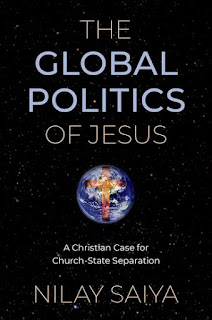
About the book, from the publisher:
A unique, timely, and wide-ranging book that formulates and applies an ethic of Jesus to the realm of global politics.--Marshal Zeringue
Since the fourth century, Christians have wrestled with how they should interact with political authority. The most common view holds that while their ultimate loyalty rightfully belongs to God, Christians also have allegiance to their countries and a moral responsibility to transform their political systems. In The Global Politics of Jesus, Nilay Saiya provides a normative critique of this conventional view and advances an alternative approach. While it may seem natural for the church to fervently engage in political life and cultivate a close relationship with the state, Saiya argues that such beliefs result in a "paradox of privilege." As he shows, when the church yields to the seduction of political power when enjoying the benefits of an alliance with the state, it struggles to adhere to its tenets, and when it resists the allure of state power, it does its best work. This unique and wide-ranging book examines the paradox of privilege in some of the most important areas of global politics and considers its implications for the church itself.